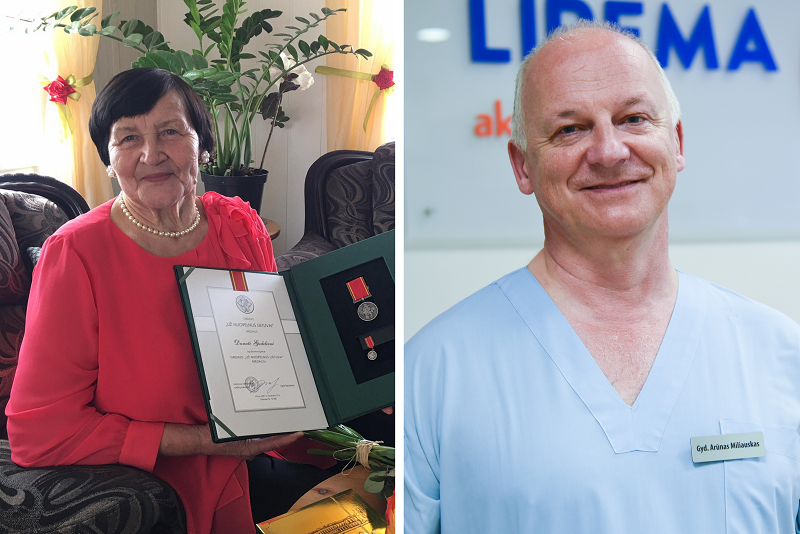“Let me tell you how much good vision or vision adjusted with additional visual aids is needed. For example, when making the bank transfer, I thought I saw where I put the comma, but I accidentally transferred ten thousand euros. Luckily, there was not enough money in the bank account, so the transaction was declined,” says Danutė Gudelienė.
D. Gudelienė is an active 75-year-old mathematics and geography teacher who established a local ethnography museum of research of Kietaviškės surroundings and past. She also received a medal of the Order of Merit for Lithuania this May. The woman previously has not complained about vision, but she noticed that it is becoming difficult to perform basic household chores.
“I’m angry with myself. I used to wear glasses because I was neglected on this issue – when my vision started to get worse, I only changed my glasses to stronger ones when I should have asked an ophthalmologist for help,” she recalls.
On the last visit to the doctor, Danutė was prescribed two pairs of glasses, one for everyday use and the other if the vision would impair.
“In the summer, I was still working as a mathematics methodologist at the National Education Agency, I read and wrote a lot. Then, I noticed that I no longer see with regular glasses. When looking closer and far away, those stronger glasses did not help either. Fearing that vision would be permanently impaired, I had to abandon projects,” D. Gudelienė recalls.
The First Symptoms of Cataracts
Concerned about her health, D. Gudelienė decided to visit specialists.
“Now, during the quarantine, it is challenging to make an appointment with the doctor and wait in lines, so instead, I decided to visit a private clinic, which my grandson and sister’s children also visited. During the visit, the diagnosis of cataract was confirmed, ”says D. Gudelienė.
According to Arūnas Miliauskas, a microsurgeon of eye diseases at the Lirema Eye Clinic, cataracts are a widespread disease of the elderly, starting completely unnoticed.
“Early stage cataracts do not cause much discomfort. The vision is only a little blurred – it becomes like a fog, and the colours are faded – at first, it may seem that you just need new glasses,” says the doctor.
Upon arrival at the clinic, doctors perform comprehensive vision tests, confirm the diagnosis, and apply the most appropriate vision correction measures.
“After extensive research, discussing all the necessary information about lenses, the doctor had allowed me to choose from several options. I chose the one that ensures better visual quality and reduces the chances of finding secondary cataracts,” says D. Gudelienė.
The Procedure is Extremely Fast and Efficient
“Patients who have not had cataract surgery come to the clinic anxious, but when it comes to operating, the second eye patient is already relaxed – they know that the operation is completely painless, and vision improves immediately after it,” says A. Miliauskas.
“Because I felt that I had reached the end of the bridge, I was calm on the day of the first operation. The discomfort during everyday household work was too inconvenient. The exceptional order in the clinic, the reception on time, the clear requirements confirmed me choosing the right place for the procedure,” D. Gudelienė recalls.
According to the microsurgeon A. Miliauskas, the operation lasts about 15 minutes. Before and after the procedure, the patient is given instructions on behaving to achieve the best result.
“During the operation, I was given clear instructions – when to sit down, when to lie down, how to put my head. Then, the doctor says: all done, you can sit down. I think, when will the operation start?” the patient jokes.
The Result Exceeded Expectations
According to D. Gudelienė, when she came home, she did not feel any discomfort. Everything was so simple.
“I felt great after the surgery. Medicines are also available to buy at the clinic. I didn’t even have to look for a pharmacy. The next day I received a call from specialists for well-being, and I also used the prescribed drops according to the instructions. The first operation went so fast and well that a week later, I was determined to have the surgery on the second eye,” D. Gudelienė assures.
Almost immediately after the operation, the patient resumed projects forgotten about due to the cataract – Danutė now teaches the students remotely.
“I now see perfectly with both eyes – this is an extraordinary feeling. I look at my four children and say, “How beautiful your clothes are.” They say, “Mom, what have you seen before?” I say, “You keep telling me that you bought new clothes, and to me, they seem to be already shabby, faded.” Now the world shines in the brightest colours!” D. Gudelienė concludes.
